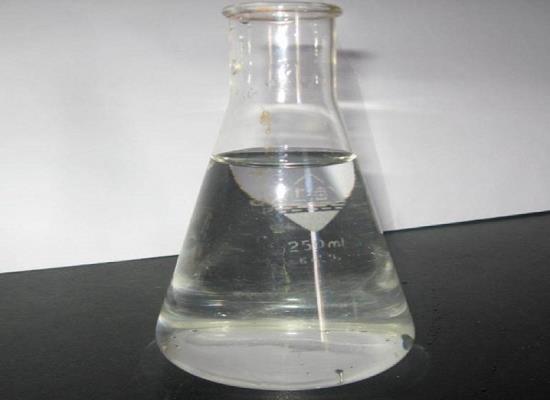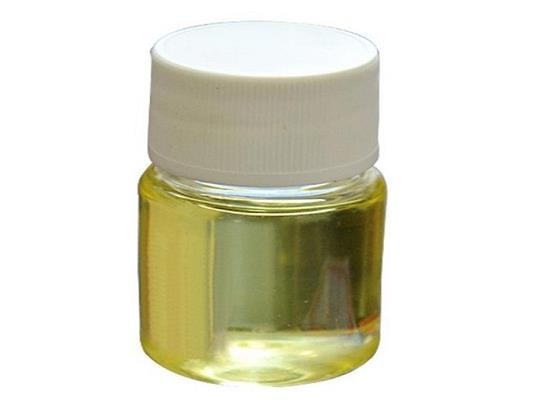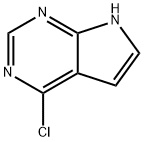4-Chloro-7H-pyrrolo[2,3-d]pyrimidine: properties, applications and safety
Oct 10,2023
General Description
4-Chloro-7H-pyrrolo[2,3-d]pyrimidine is a versatile chemical compound with diverse properties. It is a white crystalline solid, soluble in organic solvents. Chemically, it undergoes various reactions, making it valuable in the synthesis of complex organic compounds. It finds applications as a pharmaceutical intermediate, especially in the synthesis of kinase inhibitors used in disease treatment. Derivatives of this compound have shown potential as anticancer and antiviral agents, as well as for treating inflammatory diseases. Safety-wise, it has low toxicity but can cause irritation. Proper safety precautions should be taken during production, storage, transportation, and usage to prevent contact, inhalation, and fire hazards.
![Figure 1. 4-Chloro-7H-pyrrolo[2,3-d]pyrimidine.png Figure 1. 4-Chloro-7H-pyrrolo[2,3-d]pyrimidine.png](/NewsImg/2023-09-25/6383126719184002941108282.jpg)
Figure 1. 4-Chloro-7H-pyrrolo[2,3-d]pyrimidine
Properties
4-Chloro-7H-pyrrolo[2,3-d]pyrimidine is a versatile chemical compound with diverse properties. It has a molecular formula of C6H4ClN3 and a molecular weight of 153.57 g/mol. This compound appears as a white crystalline solid. Its melting point range is approximately 214-217 °C. While it is poorly soluble in water, it exhibits better solubility in organic solvents such as ethanol, methanol, and dimethyl sulfoxide (DMSO). Chemically, 4-Chloro-7H-pyrrolo[2,3-d]pyrimidine demonstrates reactivity through electrophilic substitution reactions, including nucleophilic aromatic substitution and Suzuki coupling reactions. It also participates in cross-coupling reactions catalyzed by palladium and mediated by copper, which makes it valuable in the synthesis of complex organic compounds. Moreover, this compound is amenable to functional group transformations involving its pyrimidine and chloro substituent, allowing for further derivatization. Overall, the unique properties of 4-Chloro-7H-pyrrolo[2,3-d]pyrimidine make it a versatile compound with potential applications in various fields, such as organic synthesis and drug discovery. 1
Applications
4-Chloro-7H-pyrrolo[2,3-d]pyrimidine is widely employed as a pharmaceutical intermediate due to its versatility and unique structure. It plays a crucial role in the synthesis of various pharmaceutical compounds, particularly kinase inhibitors, which are vital therapeutic agents used in the treatment of diverse diseases, including cancer. The compound's core structure and reactivity make it an ideal starting point for the development of kinase inhibitors. By introducing specific functional groups and modifications, researchers can tailor the compound to target specific kinases involved in disease pathways. This enables the design and synthesis of potent and selective inhibitors with enhanced efficacy and reduced off-target effects. Furthermore, derivatives of 4-Chloro-7H-pyrrolo[2,3-d]pyrimidine have demonstrated promising biological activities. Some derivatives have exhibited anticancer properties, inhibiting the growth and proliferation of cancer cells. Additionally, certain derivatives have displayed antiviral activity, showing potential in combating viral infections. The compound has also been explored for its anti-inflammatory properties, indicating its potential application in inflammatory disease treatment. In conclusion, 4-Chloro-7H-pyrrolo[2,3-d]pyrimidine serves as a versatile and valuable intermediate in the field of pharmaceuticals. Its usage in the synthesis of kinase inhibitors and its potential biological activities highlight its significance in drug discovery and development. 2
Safety
In terms of safety, 4-Chloro-7H-pyrrolo[2,3-d]pyrimidine is considered a low-toxicity substance. However, it is important to note that long-term or excessive exposure to this compound can lead to irritation of the respiratory mucosa, eyes, and skin. It is therefore crucial for workers involved in its production process to adhere to safety protocols, such as wearing gloves, protective clothing, goggles, respirators, and other personal protective equipment, in order to prevent skin contact and inhalation. Under normal temperature and humidity conditions, 4-Chloro-7H-pyrrolo[2,3-d]pyrimidine exhibits stability. However, it may decompose in the presence of strong acids or alkalis. Thus, proper storage is essential, and it should be kept in a cool, dry, and well-ventilated area, away from heat sources and oxidants. It is also important to note that this substance is flammable and explosive when exposed to high temperatures or open flames. Therefore, during both production and storage, precautions should be taken to avoid high temperatures or open flames. Furthermore, it is crucial to strictly adhere to relevant transportation and usage regulations when handling and transporting 4-Chloro-7H-pyrrolo[2,3-d]pyrimidine. This ensures the safe and responsible use of the substance while minimizing potential safety hazards. 3
Reference
1. Tanwar L, Börgel J, Lehmann J, Ritter T. Selective C-H Iodination of (Hetero)arenes. Org Lett. 2021 Jul 2;23(13):5024-5027.
2. Bjørnstad F, Sundby E, Hoff BH. Directed Lithiation of Protected 4-Chloropyrrolopyrimidine: Addition to Aldehydes and Ketones Aided by Bis(2-dimethylaminoethyl)ether. Molecules. 2023 Jan 17;28(3):932.
3. SAFETY DATA SHEETS: 4-Chloropyrrolo[2,3-d]pyrimidine. Guidechem, 2017.
- Related articles
- Related Qustion
- 4-Chloro-7H-pyrrolo[2,3-d]pyrimidine: Applications in Medicinal Chemistry and its Improved Synthesis May 11, 2024
Recent synthesis advancements of 4-Chloro-7H-pyrrolo[2,3-d]pyrimidine enhance kinase inhibitor development, offering high yields and accessibility for researchers.
- 4-Chloro-7H-pyrrolo[2,3-d] pyrimidine— a medical intermediate Dec 18, 2019
Being an important intermediate in medicine, 4-Chloro-7H-pyrrolo[2,3-d] pyrimidine had been widely used in the synthesis of many pharmaceutical intermediates at home and abroad.
N,N-Dimethylbenzylamine is a versatile compound used in epoxy resin production, enhancing its properties and serving as an efficient organocatalyst, but poses health and environmental risks.....
Oct 10,2023API3-Chloroaniline is a chemical compound with detrimental effects on wastewater treatment systems, but can be degraded by bacteria, sunlight, or advanced oxidation processes for environmental safety.....
Oct 10,2023API4-Chloro-7H-pyrrolo[2,3-d]pyrimidine
3680-69-1You may like
4-Chloro-7H-pyrrolo[2,3-d]pyrimidine manufacturers
- 4-Chloro-7H-pyrrolo[2,3-d]pyrimidine
-
![3680-69-1 4-Chloro-7H-pyrrolo[2,3-d]pyrimidine](/ProductImageEN/2024-05/Small/5d435759-ee99-4e78-be04-1cd02328192d.png)
- $1.00 / 1kg
- 2025-04-15
- CAS:3680-69-1
- Min. Order: 0.10000000kg
- Purity: 99%
- Supply Ability: 200KG
- 4-Chloropyrrolo[2,3-d]pyrimidine
-
![3680-69-1 4-Chloropyrrolo[2,3-d]pyrimidine](https://img.chemicalbook.com/ProductImageEN/2019-3/Small/f0c7e8e7-13cd-4ffd-9857-c465e8e31b7f.jpg)
- $22.00 / 1KG
- 2025-04-15
- CAS:3680-69-1
- Min. Order: 100 mkg
- Purity: 99%
- Supply Ability: 20mt
- 4-Chloro-7H-pyrrolo[2,3-d]pyrimidine
-
![3680-69-1 4-Chloro-7H-pyrrolo[2,3-d]pyrimidine](/ProductImageEN1/2024-11/Small/0d399d95-1d95-49bf-a1cf-32effc95ad9e.jpg)
- $10.00 / 1kg
- 2025-04-15
- CAS:3680-69-1
- Min. Order: 1kg
- Purity: 99%
- Supply Ability: 20 ton






